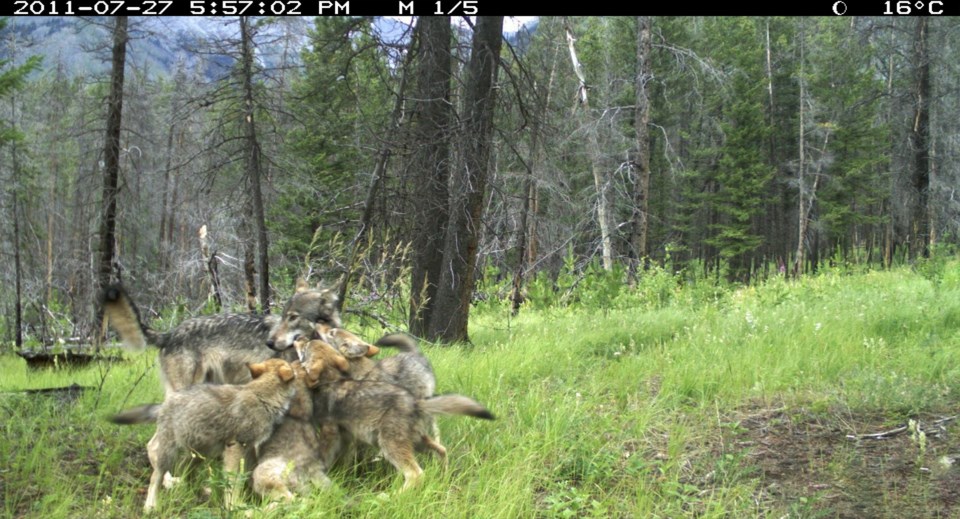BANFF – The Bow Valley wolf pack has produced pups.
Banff National Park wildlife officials don’t know how many there are, noting the few sightings of the pups have been fleeting.
“We can confirm they have had pups,” said Dan Rafla, a resource conservation officer for Banff National Park.
“The best sighting was at dark. They were fluff balls on the road and scampered into the bush, so we can’t really tell how many in total.”
In response, Parks Canada has extended the length, but reduced the size of a closure along the Bow Valley Parkway initially put in place during the critical denning period. The area on the north side of the parkway between Ranger Creek and the west end of the Hillsdale Split is off limits to humans until Aug. 31.
Although the wolves are moving out of the denning period, Rafla said this is a time that’s pretty sensitive for the pack.
“Even though the pups are mobile, they’re limited in their ability to move too far and certainly are not participating in any hunts,” he said.
Wolves establish summer sites and rendezvous sites where they hang out, and the adult wolves, or hunting wolves, bring food back to the pups.
Rafla said the closed area is considered potentially one of those areas because it’s close to the den.
“We thought it was prudent to continue modifying the closure so that we err on the side of caution,” he said.
“Based on GPS data, it’s likely the wolves are using the area. We want to make sure they’re not bothered and there’s less risk to habituation to people, or people wandering in there.”
Along with the newborn pups, the pack includes the breeding pair and a female yearling wolf. The breeding male and the young female wolf are fitted with a GPS collar, while the breeding female has a conventional VHF collar.
A male yearling was hit and killed on the Trans-Canada Highway between the Norquay interchange and Forty Mile Creek near Banff on March 11.
Historically, wolves in this area have had had a tough time surviving. They are struck and killed on the roads and railway line in a busy region that draws more than four million visitors a year.
In 2016, two female wolves were killed for public safety reasons after they got into human food and were boldly approaching people in Banff National Park. The current breeding female is a surviving member of that pack.
Rafla said closures are something Parks Canada considers when managing wildlife in the busy Bow Valley.
“It’s another tool in our pocket to maintain a level of coexistence with these animals,” he said.
Meanwhile, the female yearling in the pack, which had been showing indifference to people over the winter, has been staying out of trouble.
The gray coloured wolf, known as No. 1904, hasn’t shown any signs of aggression, but came within close range of people in broad daylight, and has been curious around vehicles.
Not wanting her to get into food or garbage, Parks put a GPS collar on her as a proactive measure earlier this spring to keep tabs on her and haze her if she came too close to busy areas.
“She’s been seen, but not very often and her behaviour has been good,” Rafla said.
Rafla said sightings of the wolves recently have been infrequent and fleeting, and when the wolves are observed, they’re typically on the move.
“The area surrounding the Town of Banff remains to be hunting grounds,” he said. “There’s lots of prey, but we haven’t had her in the townsite.”
While things are going well for the pack now, it’s not the time for people to let their guard down. It’s vital to store garbage and food properly at all times and to never feed wildlife.
“We have to remain constantly diligent because it doesn’t take long for these very intelligent animals to seek out a point of weakness,” Rafla said.
“If we as people make a mistake somewhere and they take advantage of it, their behaviour can change quite rapidly, knowing their history.”
Wolf sightings should be reported to 403-762-1470.
“It’s reporting, reporting, reporting. Data is everything to us,” Rafla said. “That informs us and we can pick up on patterns and we can work really hard proactively so we don’t have big incidents.”




